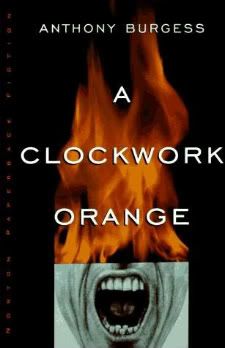Title: A Clockwork Orange
Author: Anthony Burgess
Pages: 192
Genre: Fiction
Source: My bookshelf
What you'll love: A fantastic story which presents excellent questions before the reader.
What will bug you: Trying to figure out what the characters are saying, especially in the beginning.
 This is one of those books. You know the kind... they sit on your shelf, unread. You know they're "classics". It just seems as though every time you finish a book and go for a new one it doesn't call out to you. It took "Roof Beam Reader"'s TBR challenge to make me pick up A Clockwork Orange, and I'm glad I finally got myself in gear and read it!
This is one of those books. You know the kind... they sit on your shelf, unread. You know they're "classics". It just seems as though every time you finish a book and go for a new one it doesn't call out to you. It took "Roof Beam Reader"'s TBR challenge to make me pick up A Clockwork Orange, and I'm glad I finally got myself in gear and read it!
For those of you unfamiliar with the story...
Written in 1963, this is Burgess' very scary idea of the future - criminals taking over after night falls. Our main character, Alex, is a villain of the worst kind. He steals, rapes, and physically assaults. After being arrested, he is "rehabilitated" - undergoing a procedure which makes him turn away (involuntarily) from violent acts. This leads the reader to ask - is he really rehabilitated? Does the fact that he cannot commit a violent act make him good? Is he really changed?
I love books that make the reader ask these kinds of questions. What is good and evil really?
I wasn't so sure about this story at the very beginning, which leads me to mention "what will bug you". The language was confusing for the first few chapters. The young people speak using "nadsat" slang, and Burgess jumps right into it without a lot of explanation. The words are pretty straightforward and easy to figure out through context, but until you get the basics down, it feels like - well... you ARE - speaking another language.
Once I got used to the slang, I started getting really into the story.
I also found myself using the slang in my everyday speech.
(To my husband): "Enough is enough. It's time to wake up. Open your glazzies I give you a tolchock on your gulliver."
(To the cat): "Hey - koshka. Stop trying to drink from the sink before I give you a tolchock in the rot." (For the record, I would never tolchock my koshka.)
I found the subject really fascinating. The idea of, essentially, reprogramming criminals to be physically sick at the the thought of committing violence is an interesting one. Although these people would, technically speaking, be safe to be wandering the streets - that is to say, they would not be violent - is it really sensible? Of course nothing about the person has changed. They are still violent by nature - they are simply unable to act upon their instincts. So they are not really rehabilitated at all. Their behavior has just been modified. The scary part to me - who decides the individuals who receive this treatment? That could be a scary thing. If they can condition you against violence, in the wrong hands, one could be conditioned against anything. Seems like kind of a slippery slope.
So you have these people walking around who are, at their core, violent individuals. Yet, they're unable to commit their crimes. In the right hands, and in the right situations, this could be a positive thing, right? Instead of locking these people away for life, simply treat them and make them unable to perform the acts which landed them into prison. A quick fix. Let's not worry about changing the person, just modify their behavior.
This leads us to another question entirely. In the eyes of the state and/or government, does it really matter whether of not a person is truly rehabilitated? The goal of a governing body may be different than the goal of human beings, morally. Morally, we like to think that we have "improved" the criminal before releasing them back into society - you know, made them understand how their behavior does not belong in a society. From a functional standpoint, the end result is all that matters. ...a very interesting difference. Should the government be taking morality into consideration?
It's kind of neat to note that I read a later edition of this book. Originally, the author intended for the book to be 21 chapters, however his US publisher opted to omit the final chapter. The UK versions of the book had the full chapters as intended by the author. Obviously A Clockwork Orange has turned into a modern classic since 1963, and there is a note from both Anthony Burgess and his publisher explaining the addition of this final chapter.
A wonderful read - I can see why this book is taught in many high school literature classes. It poses so many questions and opens up for plenty of debate and conversation. My favorite kind of book!

Author: Anthony Burgess
Pages: 192
Genre: Fiction
Source: My bookshelf
What you'll love: A fantastic story which presents excellent questions before the reader.
What will bug you: Trying to figure out what the characters are saying, especially in the beginning.
 This is one of those books. You know the kind... they sit on your shelf, unread. You know they're "classics". It just seems as though every time you finish a book and go for a new one it doesn't call out to you. It took "Roof Beam Reader"'s TBR challenge to make me pick up A Clockwork Orange, and I'm glad I finally got myself in gear and read it!
This is one of those books. You know the kind... they sit on your shelf, unread. You know they're "classics". It just seems as though every time you finish a book and go for a new one it doesn't call out to you. It took "Roof Beam Reader"'s TBR challenge to make me pick up A Clockwork Orange, and I'm glad I finally got myself in gear and read it!For those of you unfamiliar with the story...
Written in 1963, this is Burgess' very scary idea of the future - criminals taking over after night falls. Our main character, Alex, is a villain of the worst kind. He steals, rapes, and physically assaults. After being arrested, he is "rehabilitated" - undergoing a procedure which makes him turn away (involuntarily) from violent acts. This leads the reader to ask - is he really rehabilitated? Does the fact that he cannot commit a violent act make him good? Is he really changed?
I love books that make the reader ask these kinds of questions. What is good and evil really?
I wasn't so sure about this story at the very beginning, which leads me to mention "what will bug you". The language was confusing for the first few chapters. The young people speak using "nadsat" slang, and Burgess jumps right into it without a lot of explanation. The words are pretty straightforward and easy to figure out through context, but until you get the basics down, it feels like - well... you ARE - speaking another language.
Once I got used to the slang, I started getting really into the story.
I also found myself using the slang in my everyday speech.
(To my husband): "Enough is enough. It's time to wake up. Open your glazzies I give you a tolchock on your gulliver."
(To the cat): "Hey - koshka. Stop trying to drink from the sink before I give you a tolchock in the rot." (For the record, I would never tolchock my koshka.)
I found the subject really fascinating. The idea of, essentially, reprogramming criminals to be physically sick at the the thought of committing violence is an interesting one. Although these people would, technically speaking, be safe to be wandering the streets - that is to say, they would not be violent - is it really sensible? Of course nothing about the person has changed. They are still violent by nature - they are simply unable to act upon their instincts. So they are not really rehabilitated at all. Their behavior has just been modified. The scary part to me - who decides the individuals who receive this treatment? That could be a scary thing. If they can condition you against violence, in the wrong hands, one could be conditioned against anything. Seems like kind of a slippery slope.
So you have these people walking around who are, at their core, violent individuals. Yet, they're unable to commit their crimes. In the right hands, and in the right situations, this could be a positive thing, right? Instead of locking these people away for life, simply treat them and make them unable to perform the acts which landed them into prison. A quick fix. Let's not worry about changing the person, just modify their behavior.
This leads us to another question entirely. In the eyes of the state and/or government, does it really matter whether of not a person is truly rehabilitated? The goal of a governing body may be different than the goal of human beings, morally. Morally, we like to think that we have "improved" the criminal before releasing them back into society - you know, made them understand how their behavior does not belong in a society. From a functional standpoint, the end result is all that matters. ...a very interesting difference. Should the government be taking morality into consideration?
It's kind of neat to note that I read a later edition of this book. Originally, the author intended for the book to be 21 chapters, however his US publisher opted to omit the final chapter. The UK versions of the book had the full chapters as intended by the author. Obviously A Clockwork Orange has turned into a modern classic since 1963, and there is a note from both Anthony Burgess and his publisher explaining the addition of this final chapter.
A wonderful read - I can see why this book is taught in many high school literature classes. It poses so many questions and opens up for plenty of debate and conversation. My favorite kind of book!



Comments
Post a Comment